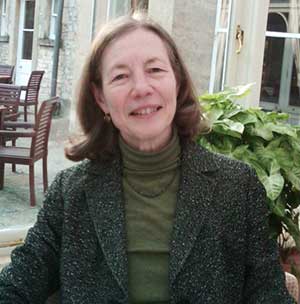Mary Jo Nye Awarded 2017 Pais Prize
By Richard Staley, University of Cambridge
The 2017 Abraham Pais Prize for the History of Physics has been awarded to Mary Jo Nye, who will receive the award in the APS March meeting in New Orleans.
Since the early 1970s, Nye has produced pathbreaking and enduring studies of the physical sciences that are distinguished equally by their attention to the coherence and integrity of the approaches taken by individual scientists, to the evolving boundaries between physics, chemistry and physical chemistry, and to the roles that critical conceptual issues such as atomism and quantum theory have played in reshaping the landscape of knowledge. Most characteristic is that in her treatment of each of these issues, she has shown how scientists’ understandings of their disciplines — and the nature of knowledge itself — have been shaped to serve the social environments within which they have worked, thereby illuminating the life of science as one of public service.
In 1972, Nye’s first book, Molecular Reality, paired a study of Jean Perrin with a treatment of the rise of atomism, exposing the multifaceted work required to offer convincing proofs of a disputed doctrine and exploring how this transformed philosophical commitments. In a series of books and edited volumes published in the 1980s and 90s, her work pioneered in addressing the communal structures and disciplinary lineaments of the physical sciences since 1800, in particular by drawing early attention to the role of the provinces in the development of science in France and by highlighting the creative interdependence of physics and chemistry. In 2003, she edited the authoritative Cambridge History of Science, Volume 5: Modern Physical and Mathematical Sciences.
In 2004 and 2011, Nye returned to biography with masterful accounts of the lives of P.M.S. Blackett and Michael Polanyi. Offering nuanced treatments of the diverse ways that these European scientists’ work and engagement with politics yielded pragmatic philosophies and sharp epistemological beliefs, across the political spectrum, Nye showed how their views in turn provoked controversy, echoed in the corridors of power, and have offered resources for the social analysis of science.
Mary Jo Nye’s intellectual life has been one of service, especially to the University of Oklahoma-Norman and Oregon State University, and to the history of science discipline in the US and internationally. She has had the courage and conviction to address problems (such as big science) well before a sufficient set of other scholars were interested enough in them to turn their collected work into a field within the history of physics. She has, again and again, incorporated methodologies (like biographical analysis) which at the time she began using them were mostly considered non-traditional in history of physics. She has never hesitated to draw on concepts in use outside the set taught to young history of physics scholars (such as deconstruction). All these she drew on and applied courageously, with full knowledge of the disciplinary prejudices she would have to confront. And over many decades she unselfishly influenced and nurtured the work and careers of a huge number of younger scholars. She may be the historian of physics working today who best encapsulates the diversity and scope of the science of physics itself.
Nye is a past president of the History of Science Society, Fellow of the American Academy of the Arts and Sciences, and of the American Association for the Advancement of Science, and a Member of the International Academy of the History of Science. Amongst her many honors are the Sarton Medal for lifetime achievement in History of Science and the Dexter Award for Outstanding Achievement in the History of Chemistry. Mary Jo Nye is married to historian Robert A. Nye, and their daughter is Lesley Nye of Pasadena, California.

Mary Jo Nye
The articles in this issue represent the views of their authors and are not necessarily those of the Forum or APS.
